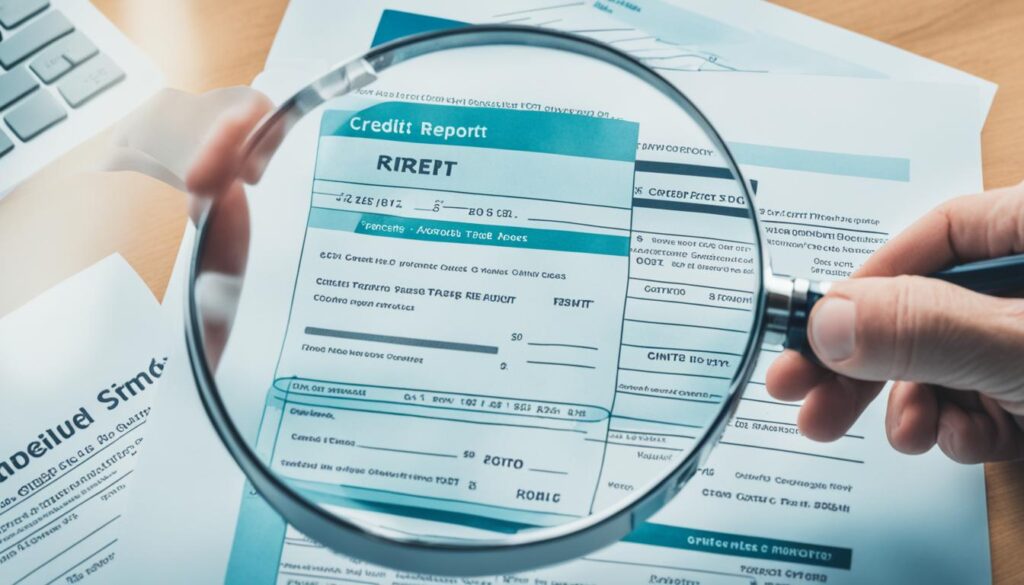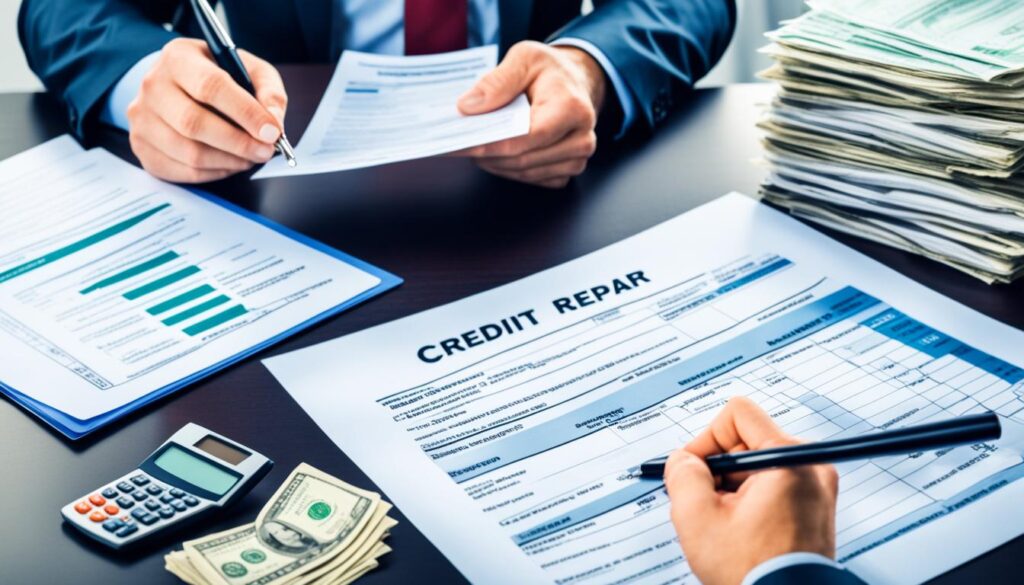Credit reports shape our financial futures. A clean record opens doors to better loans, jobs, and housing. Errors in your credit report can be troublesome. That’s where hiring a lawyer to dispute credit report issues comes in.
Inaccurate credit reports can put people in a tough spot. Credit repair services are available, but some cases need legal expertise. A lawyer specializing in credit disputes can be a powerful ally.
Choosing to hire a lawyer for credit report disputes isn’t always easy. It has its own pros and cons. Let’s explore when legal help might be best.
We’ll also look at situations where handling things on your own could work. Understanding your options is key to making the right choice.
Key Takeaways
- Credit reports significantly impact financial opportunities
- Lawyers can provide expert help with credit report disputes
- Legal assistance may be necessary for complex credit issues
- Hiring a lawyer involves weighing costs against potential benefits
- Self-dispute options exist for less complicated credit report errors
- Understanding your rights is crucial in credit dispute processes
Understanding Credit Reports and Their Impact
Credit reports are vital for your financial health. They show your credit history and affect loan approvals. Let’s explore credit reports and why they matter.
What is a credit report?
A credit report details your credit history. It shows your credit accounts, payment history, and public records. Lenders use it to check your creditworthiness.
Regular report analysis helps spot credit score issues early. This can lead to better credit repair tips and strategies.
How credit reports affect your financial life
Your credit report impacts many financial areas:
- Loan approvals and interest rates
- Rental applications
- Employment opportunities
- Insurance premiums
A good credit score opens doors to better opportunities. Review your report often and fix errors quickly.
Common errors in credit reports
Credit reports can have mistakes. Common errors include:
| Error Type | Description | Impact |
|---|---|---|
| Identity mistakes | Wrong name, address, or Social Security number | Can lead to mixed credit files |
| Account inaccuracies | Incorrect account status or balance | May lower credit score unfairly |
| Outdated information | Negative items staying beyond legal time limits | Can unnecessarily harm credit score |
Fixing these errors is key for an accurate credit profile. Regular checks help spot issues and improve your score.
The Role of a Lawyer in Credit Report Disputes

A lawyer can be your best friend when dealing with credit bureau disputes. They know credit reporting laws inside out. These experts can help remove negative items from your credit report.
A credit dispute lawyer first checks your credit report for errors. They then write strong dispute letters backed by legal knowledge. This boosts your chances of fixing mistakes.
During debt validation, attorneys can do several things. They talk to creditors and credit bureaus directly. They gather proof to support your case. They make sure everyone follows the Fair Credit Reporting Act.
- Communicate directly with creditors and credit bureaus
- Gather supporting documentation
- Ensure compliance with the Fair Credit Reporting Act
- Represent you in negotiations or legal proceedings if necessary
Lawyers stay up-to-date on credit laws and rules. This gives you an edge in tricky disputes. Their know-how helps when dealing with stubborn errors or tough creditors.
“A skilled credit dispute attorney can significantly improve your chances of correcting inaccuracies and protecting your financial future.”
DIY methods exist, but using AI tools for credit repair can work well with legal help. AI-powered solutions can create dispute letters and manage credit use. This improves your overall credit repair plan.
Using both legal smarts and tech gives you better tools. You’ll be ready to fix credit report errors and boost your finances.
Pros of Hiring a Lawyer to Dispute Credit Report
Legal help can boost your chances of fixing credit report errors. Lawyers bring valuable skills to credit disputes. Let’s look at the key benefits of getting legal assistance.
Legal Expertise and Knowledge
Credit dispute lawyers know FCRA rules inside out. They grasp complex credit laws and spot violations you might miss. Their expertise helps build strong cases against errors.
Increased Credibility with Credit Bureaus
Credit bureaus take lawyer-led disputes more seriously. Legal pros know how to talk effectively with credit agencies. This can lead to better outcomes for you.
Time-Saving Benefits
Disputing credit reports can eat up your time. Lawyers handle paperwork, follow-ups, and talks for you. This frees up your schedule for other things.
Their efficiency is great for complex issues or multiple errors. You can focus on life while they tackle the problem.
Potential for Better Outcomes
Lawyers with credit repair experience often get better results. They know winning strategies and adapt to your unique case. This approach can lead to more positive outcomes.
| Benefit | Impact |
|---|---|
| Legal Expertise | Stronger case building |
| Credibility | Increased attention from bureaus |
| Time-Saving | Faster resolution process |
| Better Outcomes | Higher success rate in disputes |
Cons of Using a Lawyer for Credit Report Disputes

Legal fees for credit score fixes can be steep. These costs might outweigh the benefits of credit repair services. It’s crucial to weigh the financial impact before hiring a lawyer.
Legal processes often take time. This can slow down your credit score improvement. Sometimes, talking to credit bureaus directly is faster.
Many credit report errors are simple to fix. You can often correct wrong personal info without a lawyer. Doing this yourself saves money and teaches you about credit management.
- High costs of legal services
- Potential for prolonged dispute processes
- Overcomplication of simple issues
Lawyers don’t guarantee success in credit repair. Results depend on the dispute and the credit bureau’s response. Free self-help methods may sometimes yield similar outcomes.
Relying on lawyers might hinder your credit skills. Learning to dispute errors is vital. Understanding credit score maintenance helps your long-term finances.
DIY Credit Report Disputes: Is It Feasible?
You can tackle credit bureau disputes on your own and save money. Many people successfully remove negative items from their credit reports without professional help. Let’s explore fixing an inaccurate credit report yourself.
Steps to Dispute Your Credit Report
Follow these steps to challenge errors in your credit file:
- Get free copies of your credit reports
- Review reports for inaccuracies
- Gather supporting documents
- Draft a dispute letter
- Send disputes to credit bureaus
- Wait for investigation results
Self-Help Resources
Numerous tools can aid your DIY credit repair journey:
- Federal Trade Commission website
- Consumer Financial Protection Bureau guides
- Credit report dispute letter templates
- Online credit monitoring services
Challenges of DIY Disputes
While self-disputing is possible, it comes with hurdles:
| Challenge | Impact |
|---|---|
| Time-consuming process | Can take months to resolve |
| Complex legal jargon | May lead to misunderstandings |
| Dealing with uncooperative creditors | Potential for frustration and delays |
| Limited knowledge of credit laws | Missed opportunities for dispute success |
Despite these challenges, many find DIY credit report disputes rewarding. It empowers you to take charge of your financial health.
You’ll learn valuable skills for maintaining a good credit score long-term. This knowledge can benefit you for years to come.
Cost Comparison: Lawyer vs. Self-Dispute

Choosing between a lawyer and self-dispute for credit report issues hinges on cost. Let’s explore the expenses for both options.
Self-dispute methods are typically free. You can get free yearly credit reports from major bureaus. However, it requires significant time investment.
You’ll need to research, gather evidence, and communicate with creditors and bureaus. This process can be time-consuming and challenging.
Credit repair services with a lawyer have fees. These vary based on case complexity and lawyer experience. Some charge hourly, others offer flat-fee packages.
| Aspect | Self-Dispute | Lawyer-Assisted |
|---|---|---|
| Initial Cost | $0 | $500 – $3000 |
| Time Investment | High | Low |
| Success Rate | Varies | Potentially Higher |
| Legal Expertise | Limited | Comprehensive |
Self-dispute is cost-effective, but a lawyer to dispute credit report issues might be worth it. They offer legal expertise and can achieve faster results. Consider your finances and credit issues’ severity.
“Investing in professional help can save time and potentially yield better outcomes, but it’s crucial to weigh the costs against your specific needs and budget.”
Credit repair experts offer a middle ground between DIY and lawyer-assisted approaches. They provide specialized knowledge at a lower cost than most attorneys.
Legal Rights and Protections in Credit Reporting
Credit reporting laws shield consumers from unfair practices and credit history mistakes. The Fair Credit Reporting Act (FCRA) governs how credit bureaus handle your data. Let’s explore your rights and how lawyers can help.
Fair Credit Reporting Act Overview
The FCRA ensures accuracy and privacy in your credit report. It grants you the right to view your report and challenge incorrect information. Credit bureaus must follow FCRA rules when managing your data.
Your Rights as a Consumer
The FCRA gives you important rights. You can get free yearly credit reports from each major bureau. You’ll receive alerts when negative items are added to your report.
You have the power to dispute inaccurate information. Outdated negative information must be removed from your report. These rights help maintain a fair credit history.
- Free annual credit reports from each major bureau
- Notifications when negative items are added
- Ability to dispute inaccurate information
- Removal of outdated negative information
If you spot errors, you can start the debt validation process. This helps correct mistakes in your credit history.
How Lawyers Leverage These Laws
Lawyers use their FCRA knowledge to protect your rights. They guide you through disputes and talk to credit bureaus for you. If needed, they can take legal action to fix credit history errors.
- Guide you through the dispute process
- Communicate with credit bureaus on your behalf
- Take legal action if needed to correct credit history errors
A lawyer’s expertise is valuable in complex cases. They ensure your rights are respected during disputes. Their help can be crucial when dealing with stubborn credit bureaus.
Conclusion
Hiring a lawyer for credit report disputes is a personal decision. Credit repair services offer benefits but have drawbacks. Legal experts bring valuable knowledge and credibility, potentially improving outcomes.
However, their services can be expensive. Tackling disputes yourself is possible and saves money. It requires time and effort but can be effective.
The Fair Credit Reporting Act protects consumers in both approaches. Your choice depends on your situation, budget, and comfort with legal matters.
The goal remains the same: fix credit score issues and ensure accurate financial information. Whether you hire a lawyer or do it yourself, taking action is crucial.

